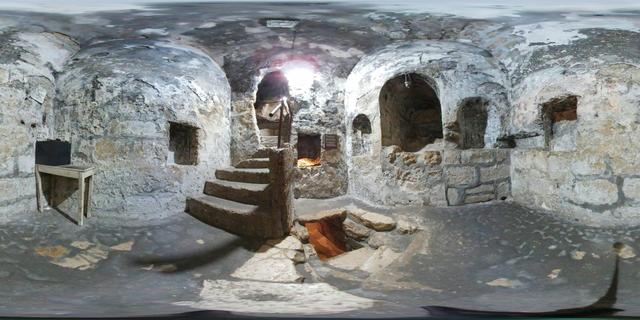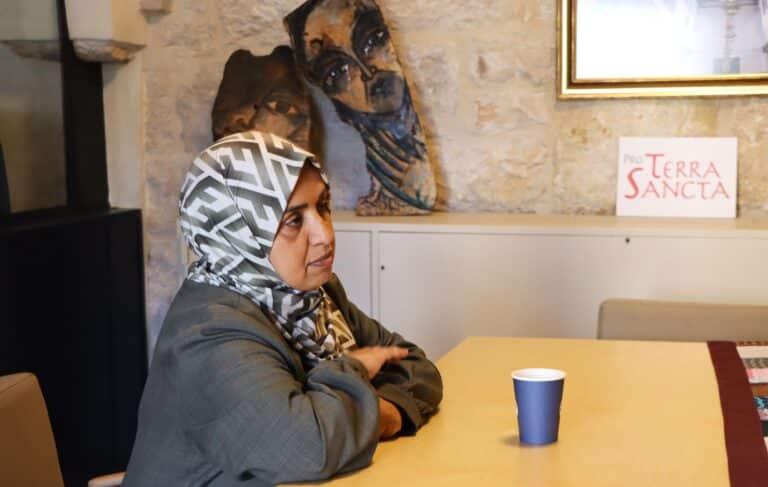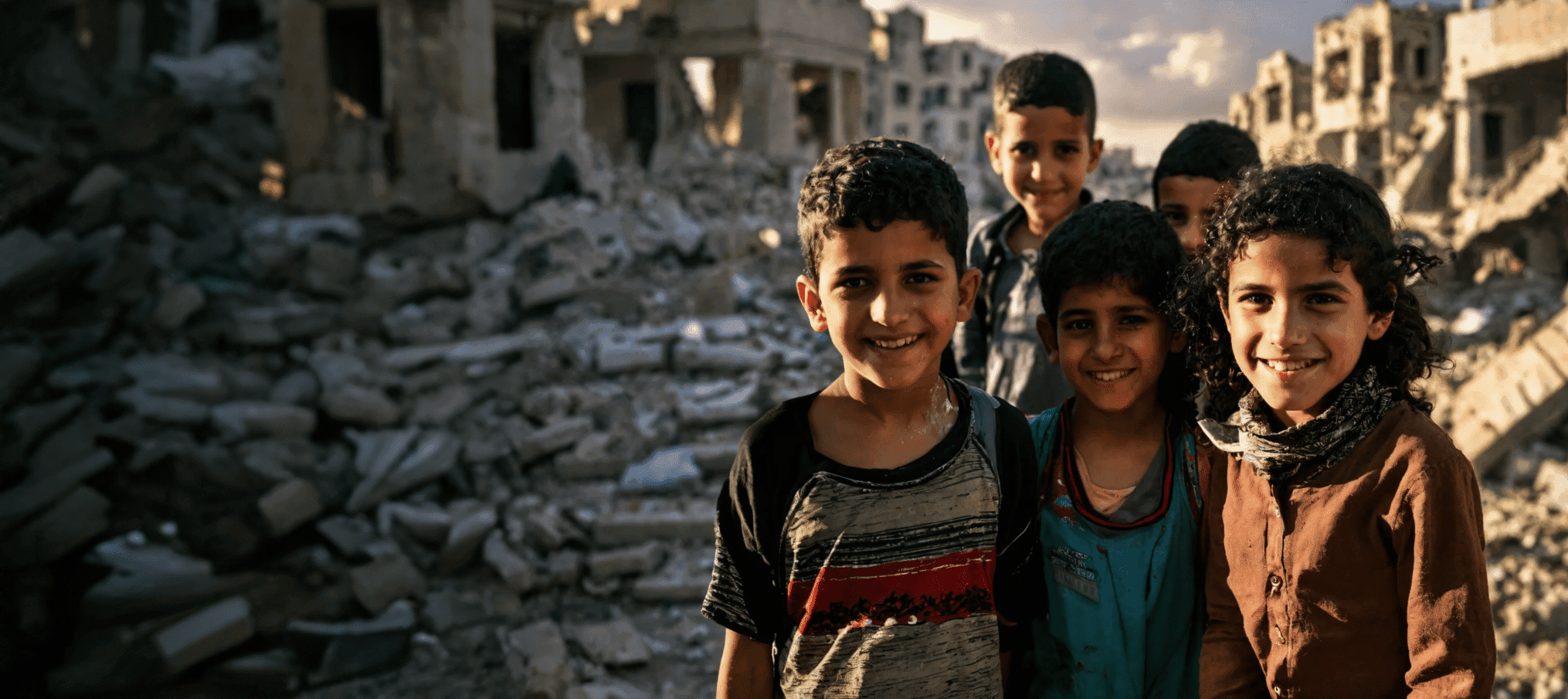The room resonates with voices: Arabic and English mingle in the smiles and cordial words that are reserved for introductions with those people you really want to meet.
We are in Bethlehem, in the office of Pro Terra Sancta where the women of the city learn to sew and embroider thanks to an online training course held by Maha, a girl from Gaza who was stranded in Egypt after the outbreak of the war. Maha has reinvented herself, transforming her activity as an artisan into a course that can be delivered digitally, thus able to cancel the distances and barriers of war.
Maha is not the only Gaza citizen forced into unwanted exile: among the women who sit in this room three come from Gaza, and who can no longer return. On their heads, the colored veils wrap them with modesty, framing the faces marked by pain and the strength necessary to remain steadfast.

"We arrived in Bethlehem before the outbreak of the war," says Najiya, "and now we can't go back." Najiya is twenty-four years old and has a one-year-old daughter named Hana, who suffers from serious heart problems. It is for Hana that Najiya in here: "In Gaza there are no facilities to provide my daughter with the necessary care. Initially, we went to Tel Hashomer Hospital in Tel Aviv, where my daughter underwent open-heart surgery, and where she was implanted with a heart battery to help her heart survive." Hana's gaze is clear, her smile carries the innocence of all children while her mother holds her in her arms.
"My son Omar also had heart surgery," Fawziyya said, "because he was born with only half of his heart working." All three women have a story in common: a sick son, the need to treat him, the trips from one hospital to another, and then the impossibility of returning: "We also went to Tel Hashomer to treat my daughter Nour's eye infection, but they couldn't find the right medicines. Nour is only six and a half years old," sighs Dima. "We were then transferred to Ashdod, and then here, to Bethlehem, where we are forced to stay."
"If we left Bethlehem to go back to our city, we would have to accept that we could no longer leave Gaza, that we could no longer return here." Najiya, Fawziyya and Dima look at each other with an understanding that only the sharing of a common pain can give, an understanding that is independent of verbalization. "We can't afford it: our children need care, we can't risk not returning to Bethlehem. We have to wait for them to give us permissions" - "Which means, we have to wait until war is over."
Najiya and Dima would like to return to Gaza: "I have lost almost everything: my house was destroyed, my brother died in this war; But that's my home, that's my land." Najiya remains silent, her words hanging; Then Dima takes the floor: "I would go back to Gaza immediately, even if they gave me permission while the war is still going on, because I have my children there." She pauses, her eyes are the eyes of a mother who knows she can't do otherwise: "But I can't do it: I'd condemn Nour to certain death. It's hard, very hard."
Fawziyya is silent, while the others tell of their desire to return: her gaze is deep and almost hurts if it rests on you. Then she explains that "I wouldn't, I wouldn't go back. I have nothing left in Gaza: my house is destroyed, my husband has been dead for ten years; And this war has taken away my children too. I had five of them: four died, under the bombs and armed attacks.Omar is all I have."
We have given these brave women their fictional names to protect their safety; Fawziyya is named after Fawziyya Al-Sindi, an Arabic poet from Bahrain, whose verses exude the same painful firmness:
Who is the blue of this dress for?
That is as dizzy as the bottom of the sea
Which one do you quickly abandon yourself on?
It's without hesitation
That he wears what looks like blood should he have to
die
Don't you know it's wasted ink?
[…]
For whom, for whom do you fight?
"Of course I miss Gaza! It's my home. By losing Gaza I have lost my home, I no longer have any country, no homeland. Initially, I was supposed to go back, but it was the war that blocked every road. Now all I have to do is take care of Omar's health."
Omar also misses Gaza, but "he's afraid to go back." When we ask what scares him, whether it's the images he sees on television or the news he hears, Fawziyya sighs: "He's not afraid of the images he sees in the news, but of what he's seen and known. Omar has lost his brothers in this war: that's what scares him."
"The greatest need now is peace, for all individuals and for all peoples; and, then, Omar's health." This is what Fawziyya asks of God: "I am afraid of losing Omar, he is my last child, all I have left. I don't fear for myself," she says, no longer trying to hold back her tears, "but I'm afraid for Omar, for his illness."
Behind the woman there are two paintings, resting on the surface of a piece of furniture: they are painted directly on two wooden boards, with irregular edges. They represent two women's faces staring at you: are they looks of accusation? Or of demand? Maybe they want to be seen as they look at you, not to be ignored as distant people to whom terrible events happen but, deep down, always affecting someone else. Perhaps they suffer, as Fawziyya suffers: her eyes are full of pain, the pain of a woman who has lost everything. Everything, except faith.
But her eyes don't accuse anyone; perhaps it is the painted women who accuse us and our indifference, perhaps they only ask us to listen to them, not to let a mother's tears fall into the void and her words of trust in a God who continues to make her feel his grip.

The three women of Gaza, in fact, cling to their unshakable faith, and in it they seem to find an island of peace: "What is written for you happens, and what happens to you is written for you. Everything is God's will," Dima explains. "Our family members who are no longer with us are now in Heaven, and I always pray that they will be." "I don't know why what we are experiencing now is happening," Najiya continues, "but I hope that one day it will be clear that it all served for one reason: for the liberation of Palestine."
"We thank you so much for the attention you give us, for your interest in us and our history: it makes us feel seen, supported, not abandoned." Fawziyya even gives her consent to be photographed, because "Telling our story means, in some way, doing ourselves justice, finally making our voices heard."
In particular, Dima is grateful for the possibility of receiving psychological support "Now the most important thing for people in Gaza would be to have access to psychological help: parents no longer know how to take care of their children, because of the anxiety of not being able to feed them and be a safe haven for them. We can survive without food, but not without the support and upbringing of those we love."
Alongside the basic needs, therefore, for oneself and for those who have remained in Gaza, psychological and emotional closeness and faith are still the cornerstones to keep hope alive: "I pray for my and my daughter's mental and spiritual serenity," says Najiya, "I don't need anything else. My needs have been greatly reduced in this situation, I don't have enough money to pay all the medical bills or to secure a house even the coming month. I pray for peace and for the people of Gaza, that God will continue to be close to them, and I pray that those who are no longer with us will be in Heaven, now, next to Him."
























